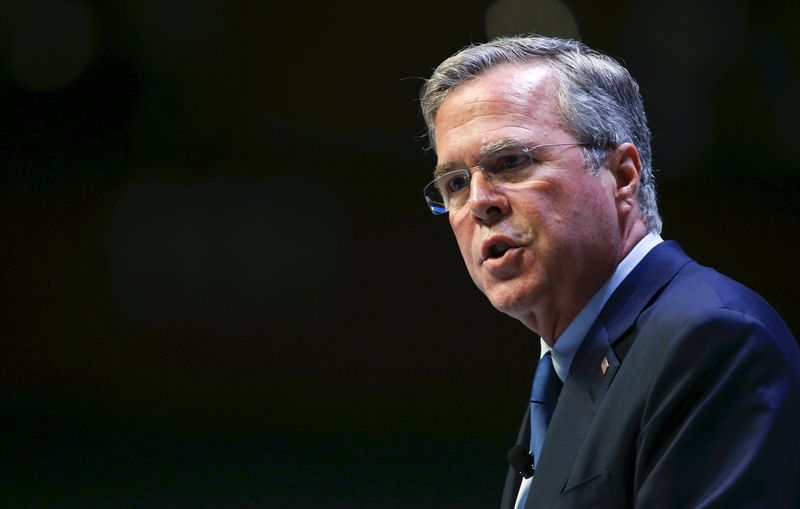By Steve Holland
WASHINGTON (Reuters) - Republican U.S. presidential candidate Jeb Bush outlined an energy plan on Tuesday that would seek to take greater advantage of booming U.S. oil and natural gas supplies to boost jobs and economic growth.
In a speech at Rice Energy Inc., in Canonsburg, Pennsylvania, Bush gave yet another detailed policy speech, presenting himself as a policy heavyweight in a Republican field so far led by Donald Trump.
In fact, Bush used Twitter (NYSE:TWTR) to tweak Trump for releasing a tax reform plan on Monday that Bush said resembled his own plan. "Finally saw Donald's 'tax plan.' Looks familiar! I'm flattered," Bush said.
Under the energy plan Bush said he would adopt if elected president in November 2016, he would lift a decades-old U.S. ban on crude oil exports and lift restrictions on natural gas exports. That would allow exports to countries like Japan, China and the European Union.
He said these actions, plus reducing regulations and allowing states more control over offshore drilling rights, would create hundreds of thousands of jobs and lower energy costs.
"We need to lift the ban on crude oil exports. It was designed in 1973 at a time when we had an oil embargo. It might have made sense then, I'm not sure it did. It makes no sense now," Bush said.
Bush's proposal comes at a time when U.S. crude prices have tumbled, losing more than half their value during the past year under pressure from a global supply glut. U.S. oil production companies have cut back producing in less profitable formations and many have pushed Congress to lift restrictions on oil exports.
In a Medium post that Bush wrote to lay out his energy platform, he said he would fight President Barack Obama's plan to force U.S. power plants to reduce carbon emissions as part of an effort to attack climate change.
Obama's aim is to encourage an aggressive shift toward renewable energy and away from coal-fired electricity, pushing utilities to invest more heavily in wind and solar energy.
Bush said in his post that the Obama plan "needs to be stopped in its tracks" and that any federal rules that would suppress domestic energy production and raise energy prices should be addressed by the next president.
Environmental groups were not pleased. Sierra Club political director Khalid Pitts said Bush's plan fails to tackle "the moral imperative of the climate crisis and just days after Pope Francis made clear that this is one of the greatest challenges facing humanity."
Bush vowed to approve the Keystone Xl pipeline, the Canada-to-Texas pipeline that the Obama administration has been reviewing for years without approving it. Democrat Hillary Clinton, who is seeking her party's nomination for president, has said she opposes the pipeline.
